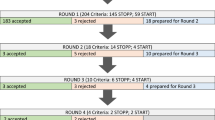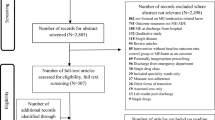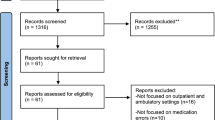Abstract
Many chronically ill adults in the United States face high prescription medication costs, yet little is known about the strategies patients adopt to cope with these costs. Through a national survey of 4,055 adults taking prescription medications for one of five chronic diseases, we compared whether respondents cut back on necessities such as food or heat to pay for medications, increased debt, or underused medications because of cost. We also examined the sociodemographic and clinical correlates and differential use by different sub-groups of these three strategies. Overall, 31% of respondents reported pursuing at least one of the strategies over the prior 12 months. Twenty-two percent had cut back on necessities, 16% had increased their debt burden, and 18% had underused prescription drugs. Among patients who underused their medication, 67% also had cut necessities or increased debt. Although we found significant differences in the way patients with varying socio-demographic characteristics responded to medication cost pressures, use of all these strategies was especially common among patients who were low-income, in poor health, and taking multiple medications.
Similar content being viewed by others
References
Adams, A. S., Soumerai, S. B., and Ross-Degnan, D. (2001). The case for a medicare drug coverage benefit: A critical review of the empirical evidence. Annu. Rev. Public Health 22: 49–61.
Baker, L. C., Bundork, M. K., Singer, S., and Wagner, T. H. (2003a). Validity of the Survey of Health and Internet and Knowledge Network’s Panel and Sample, Accessed June 18, Available at: http://www.herc.research.med.va.gov/SHI%20appendix.pdf
Baker, L., Wagner, T. H., Singer, S., and Bundorf, M. K. (2003b). Use of the Internet and e-mail for health care information: Results from a national survey. JAMA 289: 2400–2406.
Bultman, D. C., and Svarstad, B. L. (2000). Effects of physician communication style on client medication beliefs and adherence with antidepressant treatment. Patient Educ. Couns. 40: 173–185.
Bureau of Labor Statistics and the Bureau of the Census. CPS (Current Population Survey) Basic Monthly Survey. 2003.
Coughlin, S. S. (1990). Recall bias in epidemiologic studies. J. Clin. Epidemiol. 43: 87–91.
Council of American Survey Research Organizations. (1982). CASRO Task Force on Completion Rates, New York.
Council of American Survey Research Organizations. (1998). Guidelines for Survey Research Quality, New York.
DiMatteo, M. R. (1995). Patient adherence to pharmacotherapy: The importance of effective communication. Formulary 30: 596–598, 601–602, 605.
Evans, C., and Crawford, B. (1999). Patient self-reports in pharmacoeconomic studies. Their use and impact on study validity. Pharmacoeconomics 15: 241–256.
Federman, A. D., Adams, A. S., Ross-Degnan, D., Soumerai, S. B., and Ayanian, J. Z. (2001). Supplemental insurance and use of effective cardiovascular drugs among elderly medicare beneficiaries with coronary heart disease. JAMA 286: 1732–1739.
Harris, K. M. (2002). Can high quality overcome consumer resistance to restricted provider access? Evidence from a health plan choice experiment. Health Serv. Res. 37: 551–571.
Hwang, W., Weller, W., Ireys, H., and Anderson, G. (2001). Out-of-pocket medical spending for care of chronic conditions. Health Aff. 20: 267–278.
Kennedy, J., and Erb, C. (2002). Prescription noncompliance due to cost among adults with disabilities in the United States. Am. J. Pub. Health 92: 1120–24.
Krosnick, J. A., and Chang, L. A. (2001). comparison of random digit dialing telephone survey methodology with internet survey methodology as implemented by Knowledge Networks and Harris Interactive, Ohio State University.
Lentine, D. A., Hersey, J. C., Iannacchione, V. G., Laird, G. H., McClamroch, K., and Thalji, L. (2000). HIV-Related Knowledge and Stigma—United States, Morbidity and Mortality Weekly Report 49: 1062–1064.
McKenna, M. T., Speers, M., Mallin, K., and Warnecke, R. (1992). Agreement between patient self-reports and medical records for Pap smear histories. Am. J. Prev. Med. 8: 287–291.
Piette, J. D., Wagner, T. H., Potter, M., and Schillinger, D. (2004a). Health insurance status, medication self-restriction due to cost and outcomes among diabetes patients in three systems of care. Med. Care 42: 102–109.
Piette, J. D., Heisler, M., and Wagner, T. H. (2004b). Problems paying out-of-pocket medication costs among older adults with diabetes. Diab. Care 27: 384–391.
Piette, J. D., and Heisler, M., (2004c). Wagner Cost-related medication underuse among chronically ill adults: What treatments do people forego? How often? Who is at risk? Am. J. Pub. Health 94: 1782–1787.
Rost, K., and Roter, D., (1987). Predictors of recall of medication regimens and recommendations for lifestyle change in elderly patients. Gerontologist 27: 510–515.
Safran, D. G., Neuman, P., Schoen, C., et al., (2002). Prescription drug coverage and seniors: how well are states closing the gap? Health Aff. (Millwood) (Suppl. Web Exclusives): W253–W268.
Schlenger, W. E., Caddell, J. M., Ebert, L., Jordan, B. K., Rourke, K. M., Wilson, D., et al., (2002). Psychological reactions to terrorist attacks: findings from the National Study of Americans’ Reactions to September 11. JAMA 288: 581–588.
Skitka, L. J., Mullen, E., Griffin, T., Hutchinson, S., and Chamberlin, B. (2002). Dispositions, scripts, or motivated correction? Understanding ideological differences in explanations for social problems. J. Pers. Soc. Psychol. 83: 470–87.
Soumerai, S. B., Avorn, J., Ross-Degnan, D., and Gortmaker, S. (1987). Payment restrictions for prescription drugs under Medicaid. Effects on therapy, cost, and equity. N. Engl. J. Med. 317: 550–556.
Soumerai, S. B., McLaughlin, T. J., Ross-Degnan, D., Casteris, C. S., and Bollini, P. (1994). Effects of a limit on Medicaid drug-reimbursement benefits on the use of psychotropic agents and acute mental health services by patients with schizophrenia. N. Engl. J. Med. 331: 650–655.
Soumerai, S. B., Ross-Degnan, D., Avorn, J., McLaughlin, T., and Choodnovskiy, I. (1991). Effects of Medicaid drug-payment limits on admission to hospitals and nursing homes. N. Engl. J. Med. 325: 1072–1077.
Steinman, M. A., Sands, L. P., and Covinsky, K. E. (2001). Self-restriction of medications due to cost in seniors without prescription coverage. J. Gen. Intern. Med. 16: 793–799.
Strickland, W. J., and Hanson, C. M. (1996). Coping with the cost of prescription drugs. J. Health Care Poor Underserved 7: 50–62.
Tamblyn, R., Laprise, R., and Hanley, J. A., Abrahamowicz, M., Scott, S., Mayo, N., et al., (2001). Adverse events associated with prescription drug cost-sharing among poor and elderly persons. JAMA 285: 421–429.
Wagner, T. H. (2002). Using the internet to conduct surveys with veterans: Knowledge Network’s sample and sampling validity. Accessed on September 12, 2003. Available at: http://www.herc.research.med.va.gov/wagner_CHI.htm.
Author information
Authors and Affiliations
Corresponding author
Rights and permissions
About this article
Cite this article
Heisler, M., Wagner, T.H. & Piette, J.D. Patient Strategies to Cope with High Prescription Medication Costs: Who is Cutting Back on Necessities, Increasing Debt, or Underusing Medications?. J Behav Med 28, 43–51 (2005). https://doi.org/10.1007/s10865-005-2562-z
Accepted:
Issue Date:
DOI: https://doi.org/10.1007/s10865-005-2562-z




